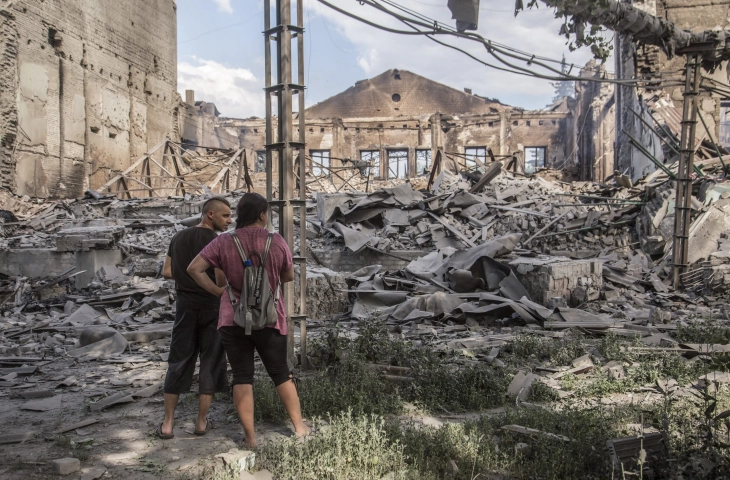Ukrainian army withdraws from eastern city of Lysychansk
- Post By Ivan Kolekevski
- 06:37, 4 July, 2022

Kiev, 4 July 2022 (dpa/MIA) - After weeks of fighting, the Ukrainian army has begun withdrawing from Lysychansk, the general staff in Kiev announced on Sunday, hours after Moscow declared that Russian forces had captured the eastern Ukrainian city.
The Ukrainian army pointed to the multiple advantages enjoyed by Russian troops in the city, adding that continuing to defend Lysychansk would have "fatal consequences."
Lysychansk, which had more than 100,000 inhabitants before the war, was the last large Ukrainian-controlled city in the Luhansk region, since its twin city Severodonetsk fell to Kremlin forces in late June.
Ukrainian President Volodymyr Zelensky described the situation around Lysychansk as difficult and dangerous, but stressed that fighting nearby was continuing, according to the UNIAN news agency.
"If our military command withdraws people from certain points along the front where the enemy has the greatest advantage - Lysychansk in particular - it means only one thing ... we will be back," he said in a video message on Sunday.
Zelensky said the Ukrainian army was continuing to advance in the Kharkiv region in the east, the Kherson region in the south and on the Black Sea. Referring to the recent Russian withdrawal from Snake Island, Zelensky said: "There will be a day when we will say the same about the Donbass ... Ukraine is not giving anything away."
Russian Defence Minister Sergei Shoigu earlier on Sunday informed Russian President Vladimir Putin that Lysychansk had fallen, granting Moscow full control of the Luhansk region, according to the Interfax news agency. Kiev had initially denied the claim.
Control of Ukraine's eastern Donbass region - consisting of Luhansk and Donetsk - is one of the Kremlin's primary goals in its invasion of Ukraine.
However, Ukrainian Defence Ministry spokesperson Yuriy Sak told the BBC that the Donbass would not be entirely lost, even if Russia were to capture the entire Luhansk region, noting that several other large towns in Donetsk remained under Kiev's control.
"These are cities that for the last couple of days [have been] targets of severe missile attacks, artillery shelling," Sak said, "but the battle for the Donbass is not over yet."
In southern Ukraine, meanwhile, the Russian-occupied city of Melitopol was shaken by dozens of explosions overnight as one of its four military bases came under Ukrainian attack, the city's former mayor, Ivan Fedorov, said on Sunday.
More than 30 artillery shells were fired at the base, putting it out of action, Fedorov said in a video address on Telegram, adding that military equipment and several fuel depots were hit, leading to continued explosions that lasted for several hours after the attacks.
At least six people including a child were killed and 15 wounded in missile attacks on the Ukrainian-controlled city of Slovyansk in the Donetsk region, according to Mayor Vadym Lyakh.
It was the "heaviest attack in recent times," Lyakh said on Facebook, adding that civilian targets rather than military facilities had been hit.
In eastern Ukraine's Kharkiv region at least three people were killed and one injured in shelling, according to regional governor Oleh Syniehubov.
Across the border in Russia, explosions in the city of Belgorod near Ukraine killed three people, according to the governor of the Belgorod region Vyacheslav Gladkov.
Four other people were reportedly injured in the explosions, including a 10-year-old child. Some 50 houses were also reportedly damaged.
Meanwhile, German Chancellor Olaf Scholz said he believed Putin would be able to continue his war for a "long time," saying the Russian leader's decision to invade Ukraine had been made well in advance.
"I think the decision ... was taken one year before it started or possibly earlier, because [Putin] prepared for it," the German leader said in an interview with CBS on Sunday.
The Kremlin, for its part, accused the West of preventing Ukraine from rejoining peace negotiations with Russia in order to drag the war out.
"Now is the moment when Western countries are betting everything on a continuation of the war," Kremlin spokesperson Dmitry Peskov told Russian state television on Sunday.
Under the leadership of the United States, Peskov charged, the West was not allowing Ukrainians "to think about peace, nor to talk about it, nor to discuss it," referring to statements by Western politicians saying they did not want to pressure Ukraine into negotiations.







